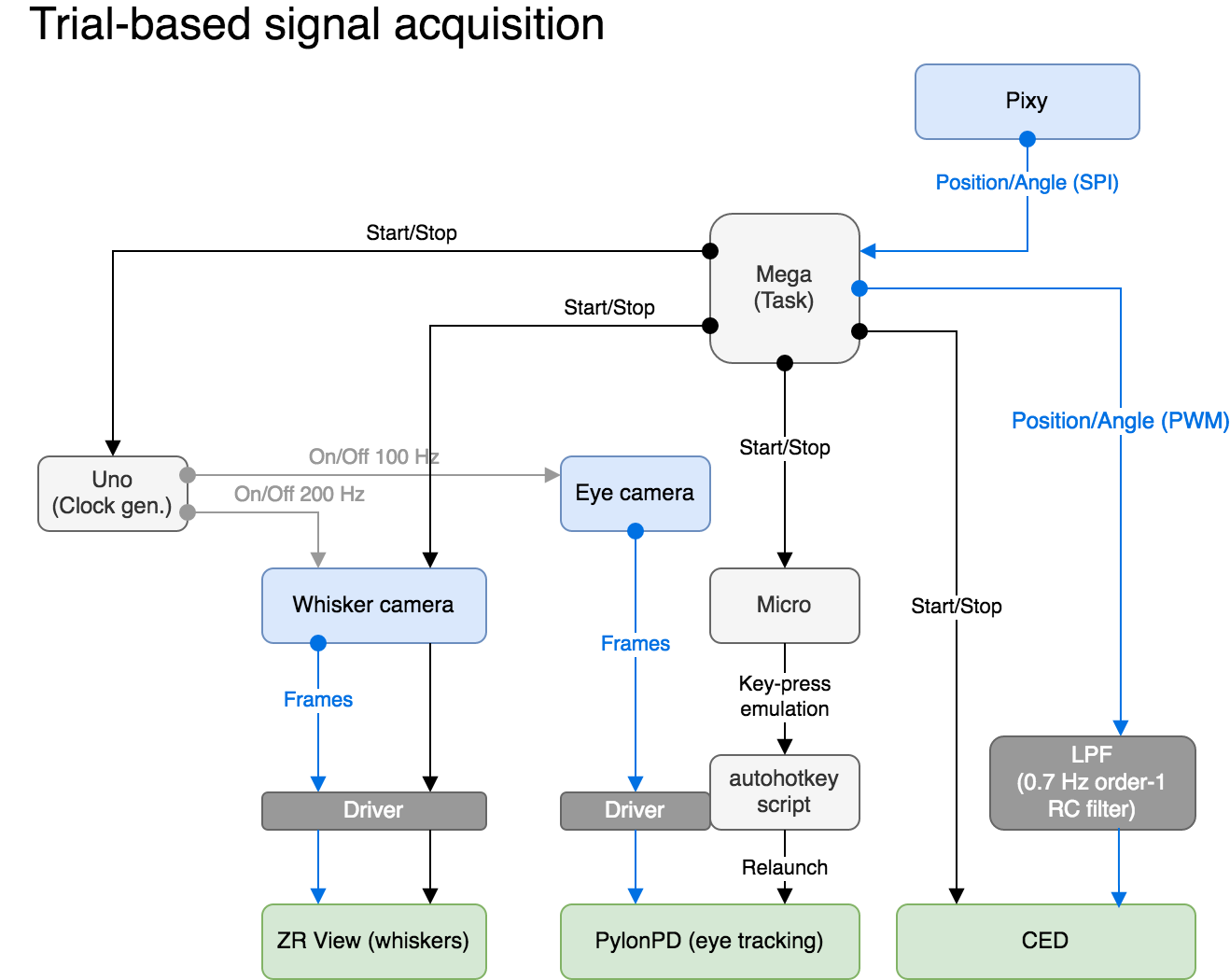README.md 4.7 KB
Raw data for: Bergmann, Sehara et al., 2022
The raw-data repository for the project "AirtrackMotorPlanning" (examines whether whiskers and pupil positions predict the animal's motor plans)
The dataset stored here is part of the root data repository.
Note that this dataset contains the un-aligned, unprocessed data. If you intend to look at the 'final' dataset (processed and aligned), refer to the formatted dataset.
Contents
File organization
File names
The files are organized as: <ANIMAL>/<SESSION>/<DOMAIN>/<ANIMAL>_<SESSION>_<DOMAIN>_run<TRIAL>, where:
ANIMALrepresenting the ID of the animal (in the patternMLAxxxxxx).SESSIONbeing the name of the session (in the patternsessionYYYY-MM-DD-001).DOMAINrepresenting the domain of recording (see below).TRIALbeing the trial index during the session.
Domain names
| Domain name | Description |
|---|---|
| top | AVI files taken at 200 Hz using ZR View (a custom video acquisition software) under the near-UV lighting, trial-based. See acquisition for more details. |
| states | CSV files containing manual annotation of behavioral states based on the top-view videos, trial-based. See behavioral state annotation for more details. |
| left-eye | AVI files of left eye videos taken at 100 Hz using PylonPD (a custom video acquisition software) under the IR-lighting, trial-based. |
| right-eye | AVI files of right eye videos taken at 100 Hz using PylonPD (a custom video acquisition software) under the IR-lighting, trial-based. |
Acquisition
Below is the schematics of acquisition. The "Start/Stop" signal from the Arduino Mega controls the timings of the beginning and the end of acquisition for each domain.
Behavioral state annotation
Names of states
Basically the idea is to take notes of the period of frames when the subject does a particular action:
- Standing still
- at the end of a corridor
- before starting another trial (
AtEnd) - waiting for the lick port to come (
Expect)
- before starting another trial (
- at the junction between a corridor and the central arena (
AtCenter) - in the midway in a corridor (
AtMidpoint)
- at the end of a corridor
- Moving backward in a corridor (
Backward) - Moving forward in a corridor (
Forward) - Turning in the central arena
- in the left (
Left) - in the right (
Right)
- in the left (
- Licking from the lick port (
Lick)
Criteria of transition
Transitions from Backward to Left, or vice versa, would be one of the the most difficult decisions. Sina used the level of the subject's eyes as the reference point, and considered "in the lane (i.e. Backward or Forward) if their eyes are still in the corridor.
Another difficulty is determining on when the animal starts to move. You will have to decide case-by-case in accordance with e.g. consistency of motion and positions.
Format
You can keep it as a CSV file, consisting of entries like below:
| Trial | FromFrame | ToFrame | State | notes |
|---|---|---|---|---|
| 1 | 1 | 4036 | AtEnd | |
| 1 | 4037 | 4385 | Backward | |
| 1 | 4386 | 4473 | Right | (ambiguous transition) |
| 1 | 4480 | 4702 | Forward | |
| ... | ... | ... | ... | ... |
- You can enter multiple trials in one file, if you want. It is better to have a column holding the trial numbers, in any case.
- Frames start from one. This is in accordance with how ZR View works.
- Frames must contain the start (inclusive) and the stop (inclusive) indexes. This is because it is sometimes hard to determine the transitions, and you may want to skip some ambiguous frames for annotation.
Copyright (c) 2022, Ronny Bergmann, Keisuke Sehara, Sina E. Dominiak, Julien Colomb, Jens Kremkow, Matthew E. Larkum, Robert N. S. Sachdev, CC-BY 4.0
